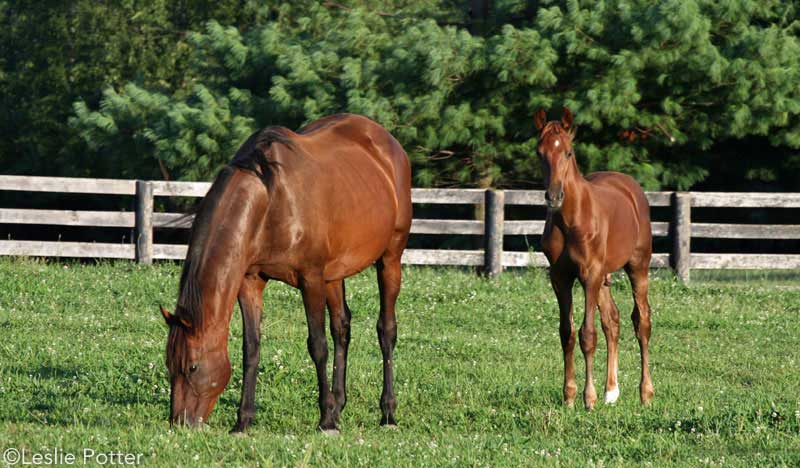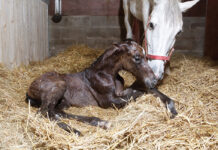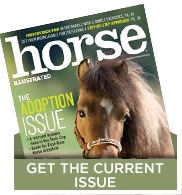As the days slowly being to lengthen and we observe slight hints that spring will eventually emerge, our mares begin to notice the seasonal shift as well. Mares are seasonal ovulators, their hormones in tune with the minute shifts in length of daylight and as the days get longer, their estrus cycles shake of the dust of hibernation. With Mother Nature’s perfect timing, a mare can be bred this spring and eleven months later—next spring—have a foal.

With this in mind, maybe you’ve been thinking about breeding your mare this spring. It’s so easy to get “foal fever” this time of year, looking at ads of gorgeous stallions and thinking of a long-legged miniature version of your beloved horse this time next year. But are you really ready to take on the relatively large responsibility of raising a foal? Is your mare the best candidate for breeding? Use the following questions to help hone your decision.
- Cost
There’s no doubt that breeding and raising a foal is a long-term investment, both in time and money. Keep in mind we’re not only talking for the next eleven months, but also months and maybe even years after birth as well, depending on your plans for the foal. Put pen to paper and really look at your finances before deciding to breed your mare. Costs may include: stud fee (e.g. numerous vet checks, booking fees, shipping fees, boarding fees); vaccine boosters and vet checks during pregnancy; increased feed costs for your mare in her final trimester; vet checks post-foaling; plus housing and care for the foal once born. If there enough room in your budget for these extra costs? - Experience/Available Help
Is this your first foaling? If so, do you have adequate resources to guide you along the way? Consider your location—how close to your vet are you in case you need emergency help during foaling? Everyone has a first foaling, so experience is not exactly necessary, but consider your comfort level if you’re a novice. - Do you have the room?
Is your mare currently boarding at a stable? If so, is there enough room for a foaling stall and for the foal itself? Early discussions with the barn manager are a must if your mare is staying on someone else’s property. If your mare is at your own barn, the same questions on space apply. If there are other horses at the barn or in the field, do you have a plan for where everyone will fit? When weaning time arrives, will you do it at your barn, or have you mare shipped away? - Is your mare the best breeding candidate?
Of course she is, at least to you. But take an objective approach. Really take some time and consider why it is you want to breed her. Does she have excellent genetics that you’d like to pass on? Is she physically gifted in competition or as a working horse? What about her conformation? Health? Age? Reproductive history? Consider asking your vet, your trainer, your stable manager, a knowledgeable neighbor or fellow rider for their honest assessments to these questions as well. The more objective information you can gather, the better you can qualitatively evaluate your mare. - What will you do with the foal?
Foals don’t stay foals forever. In six months, he or she will need to be weaned and start a training program. Would you like to keep the foal? If so, will you be able to train a youngster or find someone who can, using methods of which you approve? Or, do you plan to sell the foal? If so, do you know what the market is like in your area for the type of foal you plan to produce? The future of the foal is perhaps the most important factor to consider when deciding to breed your mare.
Liked this article? Here are others on mares and foals:
Video: Do You Need to Breed?
The Bond Between Mare and Foal
A Foal Safe Plan






Great info, ppl think “oh, free baby horse!” But no, it costs money and time to raise a colt. and if you read about how many homeless horses there are, you need to reconsider breeding.
There are many good quality horses out there that nobody can take care of anymore, and you also know exactly what you are getting if you rescue or buy a horse instead of breeding for something that you want.
Please really think about bringing more babies into this world right now, just go to any rescue group, like this one…. https://www.facebook.com/Omegahorserescue Kelly Smith works with the kill buyers trying to save as many as possible with help of other people and groups.
I have a better idea. Go to an auction (they are all over the country) and pull a weaning out of the slaughter pipeline. Yes, even babies ship to slaughter, as well as pregnant mares. Instead of adding to the problem by breeding your mare, go save a life!
If I had a nice looking mare I’d definitely want to breed her.